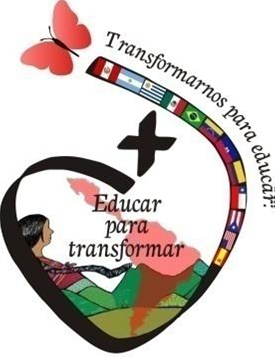The best thing of each journey is getting to know what we don’t know, finding out what we haven’t yet experienced and learning from everything we see and hear.
This is exactly what I experienced in November 2013, when the Network invited me to the Latin American and the Caribbean forum that took place in Lima, Peru. I knew a little about the existence of this organization and its functions, and I’m going to share something of my experience.
The network of Educational Institutions of the Sacred Heart of Latin America and the Caribbean gathers every three years to evaluate and analyze the engagements and the educative and formative challenges of the region. The previous meeting had taken place in Mexico. Representatives from Spain and the United States joined the Red Lac group to contribute ideas and join in the work. The experience was useful in all its aspects: educative, cultural, spiritual and personal. The following countries sent representives: Colombia, Argentina, Puerto Rico, Mexico, Peru, Uruguay, Chile, Spain and the United States (San Francisco, Miami and Chicago).
Education in Latin American countries is complex, interesting and valuable. During my stay, I had the opportunity to see and understand what is commonly known as Popular Education, the education of people, people with low economic resources. The effort and passion of educators and private institutions in providing structure, support and collaboration is incredible. I visited the “Fe y Alegría” (Faith and Joy) School, one hour and a half from Lima. The School is located in a village overwhelmed by challenges and lacking basic necessities. Fe y Alegría provides free education, a place of joy, hope and learning. The joy of the students is evident as well as teachers’ dedication and the support of the parents. The latter attend all the academic meetings and moreover they participate in projects benefitting the school. For instance, they built the playground where children play outdoor sports.
I also had the wonderful opportunity to visit the evening programs offered by Sacred Heart Schools. Their main objective is to give adults the chance to develop themselves as people and learn from different workshops: manual arts, sewing, shoe repair, hairdressing and the making of confection. I wish our schools in Chicago could offer something as valuable as these programs!
Our working days were long and productive. Daily prayer was our first activity and it was organized by the different countries. The heart of Sacred Heart was always present and the opportunity of meditating and reflecting animated us, giving us the strength to start our work.
At the end of each session, the coordination team kept working until late to continuously update the document. At the end of the week the final document had to be ready, so the working hours were interminable. The dedication and passion of the participants was evident. Personally I was exhausted but day after day I felt more satisfied and grateful to have had this opportunity. I could spend hours writing about my experience, considering that it not only allowed me to know the education systems, but also to value Latin American culture and tradition. Members of the representative countries took part in dances and shared something delightful of their own country. And of course, those coming from the United States, including me, enjoyed dancing YMCA for everyone.
I feel more still needs to be done, starting by informing the North American Network community about the existence of RedLac. I think a lot of educators, schools, principals and administrators don’t know this organism of our larger Network. I would be very happy if there were an organization of some kind that brought together the principals to give them the opportunity to learn about RedLac. Globalization is the current theme and we, in the Sacred Heart Network, have all the necessary means to develop this theme. There is an International Network that must function actively in these moments in which the world is developing linkages. Sometimes I feel we are centered in our own educative systems and we don’t see beyond frontiers.
Ana du Rousier, rscj, the Philippine of Latin America, was another big discovery for me and I hope I can write about her soon.
Lourdes Weber
Section |Formal Education
Province |Antilles|Argentina/Uruguay|Brazil|Chile|Mexico|Peru|United States and Canada|Venezuela
Tags |Network of Schools
